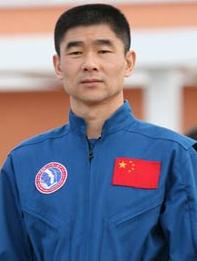China Daily
story
(26
Sep 08) |
 Less
than a day before the launch of the Shenzhou VII spaceship, astronaut Liu
Boming said he couldn't wait to experience a "real" loss of gravity. "I
will share it with you when I come back," said the 42-year-old, brimming
with a smile. (Image, from left to right: Jing Haipeng, Zhai Zhigang and
Liu Boming () in the Shenzhou VII module.) Less
than a day before the launch of the Shenzhou VII spaceship, astronaut Liu
Boming said he couldn't wait to experience a "real" loss of gravity. "I
will share it with you when I come back," said the 42-year-old, brimming
with a smile. (Image, from left to right: Jing Haipeng, Zhai Zhigang and
Liu Boming () in the Shenzhou VII module.)
Exactly 10 years ago, the three were among
a 14-member team selected for the country's manned space program. In the
summer of 1996, when China began picking astronauts from its ranks of fighter
pilots. Thousands applied, and evaluations were based upon stringent qualification
criteria like flight hours, academic degrees and physical condition. Hundreds
were selected for interviews. By the end of 1997, just 14 had survived
extensive testing.
On January 5, 1998, the 14 men replaced their
fighter pilot armband with a golden spaceflight armband. All remember their
feelings of excitement, fearlessness and strong anticipation the day they
assembled. From then on, they have led a life of abstinence to prepare
for the rigors of spaceflight.
According to strict rules, they were not permitted
to dine outside their training centers or disclose their identities, and
can only go home on weekends. Before the launch of the spaceship, they
stayed in a heavily guarded quarantine facility to protect them from any
viruses.
They had to learn 58 disciplines ranging from
English, astronomy and physics, a tall order they likened to 58 "ladders"
to space. Besides academic pursuit, intensive training programs involving
fast-spinning centrifuges and underwater training were also demanding.
The first generation of Chinese astronauts
has been honored as a group who realized the world's most populous nation's
space dreams, but not all of them are rewarded with the chance to fly.
As well as the Shenzhou VII trio, three other members of the squad get
the chance to fly, and the rest will retire or transfer to other jobs because
of an age limit. |
|



 The
Shenzhou-VII spaceship will carry (left to right on the photo): Jing Haipeng,
Zhai Zhigang and Liu Boming, all aged 42, for China's third manned space
mission.
The
Shenzhou-VII spaceship will carry (left to right on the photo): Jing Haipeng,
Zhai Zhigang and Liu Boming, all aged 42, for China's third manned space
mission.
 Less
than a day before the launch of the Shenzhou VII spaceship, astronaut Liu
Boming said he couldn't wait to experience a "real" loss of gravity. "I
will share it with you when I come back," said the 42-year-old, brimming
with a smile. (Image, from left to right: Jing Haipeng, Zhai Zhigang and
Liu Boming () in the Shenzhou VII module.)
Less
than a day before the launch of the Shenzhou VII spaceship, astronaut Liu
Boming said he couldn't wait to experience a "real" loss of gravity. "I
will share it with you when I come back," said the 42-year-old, brimming
with a smile. (Image, from left to right: Jing Haipeng, Zhai Zhigang and
Liu Boming () in the Shenzhou VII module.)